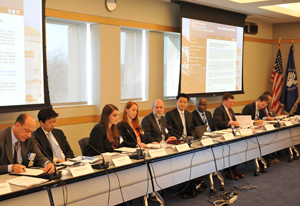Briefing on the Seoul Nuclear Security Summit
On March 12, the U.S. Institute of Peace’s (USIP) Center for Conflict Management and the Harvard Kennedy School’s Belfer Center for Science and International Affairs co-convened a closed briefing on the Seoul Nuclear Security Summit for senior diplomats of countries whose head of state will be participating in the summit. Ambassadors, Deputy Chiefs of Mission, and Heads of Political Section from over 30 embassies participated in the briefing.
March 15, 2012
On March 12, the U.S. Institute of Peace’s (USIP) Center for Conflict Management and the Harvard Kennedy School’s Belfer Center for Science and International Affairs co-convened a closed briefing on the Seoul Nuclear Security Summit for senior diplomats of countries whose head of state will be participating in the summit. Ambassadors, Deputy Chiefs of Mission, and Heads of Political Section from over 30 embassies participated in the briefing. The summit will be the largest of its kind in the security field that focuses on international cooperative measures to protect nuclear materials and facilities from terrorist groups.
 This closed briefing was the final activity of the USIP-initiated Seoul Nuclear Security Summit Study Group (SNS3G). Launched in fall 2010, SNS3G builds on the key findings of the USIP-facilitated Congressional Commission on the Strategic Posture of the United States, which was directed by Paul Hughes. USIP placed early emphasis on the need for comprehensive preparations for the Seoul Nuclear Security Summit at the Institute’s 4th U.S.-South Korea-Japan Trilateral Dialogue in Northeast Asia Track 1.5 conference, which was convened in Seoul in January 2011. SNS3G’s key objective has been to work with U.S. and South Korean officials and technical experts to help ensure that the March 26-27 summit in Seoul leads to concrete progress in improving nuclear security. Speakers included Matthew Bunn (Harvard University), Michelle Cann (Partnership for Global Security), Kelsey Davenport (Arms Control Association), and Abiodun Williams (USIP). The experts highlighted the need for and specific ways to bolster nuclear security and prevent nuclear terrorism. John Park (USIP), who directs the Institute’s Korea Working Group, moderated the session.
This closed briefing was the final activity of the USIP-initiated Seoul Nuclear Security Summit Study Group (SNS3G). Launched in fall 2010, SNS3G builds on the key findings of the USIP-facilitated Congressional Commission on the Strategic Posture of the United States, which was directed by Paul Hughes. USIP placed early emphasis on the need for comprehensive preparations for the Seoul Nuclear Security Summit at the Institute’s 4th U.S.-South Korea-Japan Trilateral Dialogue in Northeast Asia Track 1.5 conference, which was convened in Seoul in January 2011. SNS3G’s key objective has been to work with U.S. and South Korean officials and technical experts to help ensure that the March 26-27 summit in Seoul leads to concrete progress in improving nuclear security. Speakers included Matthew Bunn (Harvard University), Michelle Cann (Partnership for Global Security), Kelsey Davenport (Arms Control Association), and Abiodun Williams (USIP). The experts highlighted the need for and specific ways to bolster nuclear security and prevent nuclear terrorism. John Park (USIP), who directs the Institute’s Korea Working Group, moderated the session.
During March 20-22, USIP’s Academy will be launching a new course titled “China's Nuclear Posture, North Korea's Nuclear Challenge, and U.S. National Security” that explores nuclear security and other nuclear-related issues in Northeast Asia. For more information regarding registration, click here.



